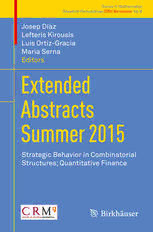
Extended Abstracts Summer 2015: Strategic Behavior in Combinatorial Structures; Quantitative Finance PDF
Preview Extended Abstracts Summer 2015: Strategic Behavior in Combinatorial Structures; Quantitative Finance
Trends in Mathematics Research Perspectives CRM Barcelona Vol.6 Josep Díaz Lefteris Kirousis Luis Ortiz-Gracia Maria Serna Editors Extended Abstracts Summer 2015 Strategic Behavior in Combinatorial Structures; Quantitative Finance Trends in Mathematics Research Perspectives CRM Barcelona Volume 6 Serieseditors EnricVentura AntoniGuillamon Since1984theCentredeRecercaMatemàtica(CRM)hasbeenorganizingscientific eventssuchasconferencesorworkshopswhichspanawiderangeofcutting-edge topicsinmathematicsandpresentoutstandingnewresults. Inthefallof2012,the CRM decidedto publishextendedconferenceabstractsoriginatingfrom scientific eventshostedatthecenter.Theaimofthisinitiativeistoquicklycommunicatenew achievements,contributeto a fluentupdateofthe state of theart, andenhancethe scientificbenefitoftheCRMmeetings.Theextendedabstractsarepublishedinthe subseriesResearchPerspectivesCRMBarcelonawithintheTrendsinMathematics series.Volumesinthesubserieswillincludeacollectionofrevisedwrittenversions ofthecommunications,groupedbyevents. Moreinformationaboutthisseriesathttp://www.springer.com/series/4961 Extended Abstracts Summer 2015 Strategic Behavior in Combinatorial Structures Josep Díaz Lefteris Kirousis Maria Serna Editors Quantitative Finance Luis Ortiz-Gracia Editor Editors JosepDíaz LefterisKirousis DepartamentdeCieJnciesdelaComputació DepartmentofMathematics UniversitatPoliteJcnicadeCatalunya NationalandKapodistrianUniversity Barcelona,Spain Zografos,Greece LuisOrtiz-Gracia MariaSerna DepartmentofEconometrics DepartamentdeCieJnciesdelaComputació UniversityofBarcelona UniversitatPoliteJcnicadeCatalunya Barcelona,Spain Barcelona,Spain ISSN2297-0215 ISSN2297-024X (electronic) TrendsinMathematics ISBN978-3-319-51752-0 ISBN978-3-319-51753-7 (eBook) DOI10.1007/978-3-319-51753-7 LibraryofCongressControlNumber:2017932282 Mathematics SubjectClassification(2010):Firstpart:05C80,34E10,37N99,52C45,60C05,68W40, 68Q32, 68W20, 82B26, 90B15, 90B60, 91B15; Second part: 62P05, 60G07, 60E10, 65T60, 91B02, 91G60,91G80 ©SpringerInternationalPublishingAG2017 Thisworkissubjecttocopyright.AllrightsarereservedbythePublisher,whetherthewholeorpartof thematerialisconcerned,specificallytherightsoftranslation,reprinting,reuseofillustrations,recitation, broadcasting,reproductiononmicrofilmsorinanyotherphysicalway,andtransmissionorinformation storageandretrieval,electronicadaptation,computersoftware,orbysimilarordissimilarmethodology nowknownorhereafterdeveloped. Theuseofgeneraldescriptivenames,registerednames,trademarks,servicemarks,etc.inthispublication doesnotimply,evenintheabsenceofaspecificstatement,thatsuchnamesareexemptfromtherelevant protectivelawsandregulationsandthereforefreeforgeneraluse. Thepublisher,theauthorsandtheeditorsaresafetoassumethattheadviceandinformationinthisbook arebelievedtobetrueandaccurateatthedateofpublication.Neitherthepublishernortheauthorsor theeditorsgiveawarranty,expressorimplied,withrespecttothematerialcontainedhereinorforany errorsoromissionsthatmayhavebeenmade.Thepublisherremainsneutralwithregardtojurisdictional claimsinpublishedmapsandinstitutionalaffiliations. Printedonacid-freepaper ThisbookispublishedunderthetradenameBirkhäuser,www.birkhauser-science.com TheregisteredcompanyisSpringerInternationalPublishingAG Theregisteredcompanyaddressis:Gewerbestrasse11,6330Cham,Switzerland Contents PartI StrategicBehaviorinCombinatorialStructures OnthePush&PullProtocolforRumourSpreading.......................... 3 Hüseyin Acan, Andrea Collevecchio, Abbas Mehrabian, andNickWormald RandomWalksThatFindPerfectObjectsandtheLovász LocalLemma..................................................................... 11 DimitrisAchlioptasandFotisIliopoulos LogitDynamicswithConcurrentUpdatesforLocal InteractionGames ............................................................... 17 Vincenzo Auletta, Diodato Ferraioli, Francesco Pasquale, PaoloPenna,andGiuseppePersiano TheSetChromaticNumberofRandomGraphs............................. 23 AndrzejDudek,DieterMitsche,andPawełPrałat CarpoolinginSocialNetworks ................................................. 29 AmosFiat,AnnaR.Karlin,EliasKoutsoupias,ClaireMathieu, andRotemZach WhotoTrustforTruthfulFacilityLocation?................................. 35 DimitrisFotakis,ChristosTzamos,andEmmanouilZampetakis Metric and SpectralPropertiesof Dense Inhomogeneous RandomGraphs.................................................................. 41 NicolasFraimanandDieterMitsche On-LineListColouringofRandomGraphs.................................. 47 Alan Frieze, Dieter Mitsche, Xavier Pérez-Giménez, andPawełPrałat v vi Contents ApproximationAlgorithmsforComputingMaximin ShareAllocations................................................................. 55 GeorgiosAmanatidis, EvangelosMarkakis, Afshin Nikzad, andAminSaberi AnAlternateProofoftheAlgorithmicLovászLocalLemma .............. 61 Ioannis Giotis, Lefteris Kirousis, Kostas I. Psaromiligkos, andDimitriosM.Thilikos LearningGame-TheoreticEquilibriaViaQueryProtocols................. 67 PaulW.Goldberg TheLowerTail:PoissonApproximationRevisited........................... 73 SvanteJansonandLutzWarnke PopulationProtocolsforMajorityinArbitraryNetworks.................. 77 George B. Mertzios, Sotiris E. Nikoletseas, ChristoforosL.Raptopoulos,andPaulG.Spirakis TheAsymptoticValueinFiniteStochasticGames........................... 83 MiquelOliu-Barton AlmostAll5-RegularGraphsHavea3-Flow................................. 89 PawełPrałatandNickWormald PartII QuantitativeFinance OntheShort-TimeBehaviouroftheImpliedVolatilitySkew forSpreadOptionsandApplications.......................................... 97 ElisaAlòsandJorgeA.León An Alternative to CARMA Models via Iterations ofOrnstein–UhlenbeckProcesses.............................................. 101 ArgimiroArratia,AlejandraCabaña,andEnriqueM.Cabaña Euler–PoissonSchemesforLévyProcesses ................................... 109 AlbertFerreiro-Castilla OnTime-ConsistentPortfolioswithTime-InconsistentPreferences....... 115 JesúsMarín-Solano AGenericDecompositionFormulaforPricingVanillaOptions UnderStochasticVolatilityModels ............................................ 121 RaúlMerinoandJosepVives AHighlyEfficientPricingMethodforEuropean-StyleOptions BasedonShannonWavelets .................................................... 127 LuisOrtiz-GraciaandCornelisW.Oosterlee ANewPricingMeasureintheBarndorff-Nielsen–Shephard ModelforCommodityMarkets ................................................ 133 SalvadorOrtiz-Latorre Part I Strategic Behavior in Combinatorial Structures Foreword The Workshop on Strategic Behavior and Phase Transitions in Random and ComplexCombinatorialStructureswasheldinthe CentredeRecercaMatemàtica (CRM) in Bellaterra (Barcelona) from June 8th to 12th, 2015. This workshop was part of a research activity in CRM under the umbrella name Algorithmic PerspectivesinEconomicsandPhysicsextendedfromApril7thtoJune19th,2015. Besides CRM, this research activity was funded by several Catalan organizations (Institutd’EstudisCatalans,InstitucióCentresdeRecercadeCatalunya,Universitat AutònomadeBarcelona,andGeneralitatdeCatalunya)andbytheSimonsInstitute fortheTheoryofComputing.Theorganizercommitteefortheprogramconsistedof DimitrisAchlioptas(DepartmentofComputerScience,UCSantaCruz),JosepDíaz (Departmentof ComputerScience, UniversitatPolitècnica de Catalunya),Lefteris Kirousis (Department of Mathematics, National and Kapodistrian University of Athens), and María Serna (Department of Computer Science, Universitat Politèc- nicadeCatalunya). Themainresearchthemeoftheworkshopwastoexplorepossibletiesbetween phasetransitionsononehand,andgametheoryon theother.To bemorespecific, notethatanimportantresearchareaofthelastdecadeishowatomicagents,acting locallyandmicroscopically,leadtodiscontinuousmacroscopicchanges.Thispoint of view has proved to be especially useful in studying the evolution of random and usually complex combinatorial objects (typically, networks) with respect to discontinuouschangesin globalparameterslike connectivity.Naturally, there is a strategicelementintheformationofatransition:theatomicagentsseek“selfishly" to optimize a local microscopic parameter aiming at macroscopic changes that optimize their utility. Investigating the question of whether the connection of microscopic strategic behavior with macroscopic phase transitions is a legitimate andmeaningfulresearchobjectivewasthescopeoftheworkshop. The workshopwas attendedby morethan thirtyregisteredparticipants,several ofwhichwerePh.D.studentsorearlycareerpost-doctoralresearchers.Becauseof theno-fee,openaccesspolicythattheorganizersoptedfor,thereweremanymore 2 I StrategicBehaviorinCombinatorialStructures non-registeredparticipants.Theconferencefollowedaratherrelaxedtimetablethat encouragedimpromptudiscussionsandinteractions. The formal program comprised of some twenty presentations, more or less equally divided between the areas of random graphs and phase transitions on one hand, and game theory on the other. The organizers actively sought to have renownedresearchersgivesomeofthetalksandatthesametimetodrawfromthe poolofearlycareer,promisingresearcherstopresenttheircurrentwork.Giventhe diversebackgroundoftheaudience,presentationsatatrans-thematicstyleandata nonspecialized,highlevelwereencouraged. Barcelona,Spain JosepDíaz Athens,Greece LefterisKirousis Barcelona,Spain MariaSerna September2015 On the Push&Pull Protocol for Rumour Spreading HüseyinAcan,AndreaCollevecchio,AbbasMehrabian,andNickWormald Abstract The asynchronous push&pull protocol, a randomized distributed algo- rithm for spreading a rumour in a graph G, is defined as follows. Independent exponentialclocksofrate1areassociatedwiththeverticesofG,onetoeachvertex. Initially,onevertexofGknowstherumour.Whenevertheclockofavertexxrings, itcallsarandomneighboury:ifxknowstherumourandydoesnot,thenx tellsy therumour(apushoperation),andifxdoesnotknowtherumourandyknowsit,y tellsxtherumour(apulloperation).TheaveragespreadtimeofGistheexpected timeittakesforallverticestoknowtherumour,andtheguaranteedspreadtimeof G is thesmallest time t such thatwith probabilityatleast 1(cid:2)1=n,aftertime t all verticesknowtherumour.Thesynchronousvariantofthisprotocol,inwhicheach clockringspreciselyattimes1;2;:::,hasbeenstudiedextensively. We prove the following results for any n-vertex graph: in either version, the average spread time is at most linear even if only the pull operation is used, and theguaranteedspreadtimeiswithinalogarithmicfactoroftheaveragespreadtime, so it is O.nlogn/. In the asynchronous version, both the average and guaranteed spreadtimesare(cid:2).logn/.Wegiveexamplesofgraphsillustratingthatthesebounds arebestpossibleuptoconstantfactors. We also prove the first theoretical relationshipsbetween the guaranteedspread times in the two versions. Firstly, in all graphs the guaranteed spread time in the asynchronousversioniswithinanO.logn/factorofthatinthesynchronousversion, andthisistight.Next,wefindexamplesofgraphswhoseasynchronousspreadtimes are logarithmic, but the synchronousversions are polynomially large. Finally, we H.Acan((cid:2))(cid:129)N.Wormald SchoolofMathematicalSciences,MonashUniversity,Clayton,VIC,Australia e-mail:[email protected];[email protected] A.Collevecchio SchoolofMathematicalSciences,MonashUniversity,Clayton,VIC,Australia Ca’FoscariUniversity,Venice,Italy e-mail:[email protected] A.Mehrabian DepartmentofCombinatoricsandOptimization,UniversityofWaterloo,Waterloo,ON,Canada e-mail:[email protected] ©SpringerInternationalPublishingAG2017 3 J.Díazetal.(eds.),ExtendedAbstractsSummer2015,TrendsinMathematics6, DOI10.1007/978-3-319-51753-7_1
